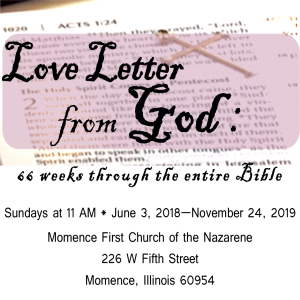Episodes

Sunday Oct 28, 2018
Sunday Oct 28, 2018
John 3:16
For God so loved the world that he gave his only son, that who ever believes in him should not perish but have everlasting life
Psalm 1, 13, 150
--
Let us pray:
Hide me behind your cross, Lord Jesus. Articulate the Father’s heart through my voice and let the Holy Spirit breathe new life to us, opening our ears to hear the message of God. Amen
Music connects us to moments. Couples in love select a song that matters to them. They play it at their wedding. Daughters and daddies dance at that same wedding, playing music that remind them of their relationship. We sing lullabies to our babies, dance in our cars to the radio as it plays songs. We commemorate those who have gone on, big moments in our collective memory, and even decades of time are recalled quickly and swiftly in just a few notes. We write our emotions in remembered time with the sounds of song.
These books on the pulpit this morning are hymnals – most Nazarene, although 1 Methodist – and there are songs in here that connect me to my childhood. There’s a song that we’ve sung here that transports me back to a church of my youth – one with black and white pews and Sunday night pick-a-songs. It is ‘And the trees of the field will clap their hands, the trees of the field will clap their hands, the trees of the field will clap their hands as we go out with joy’. Music is a way for us to time travel, to remember how we felt, to remember what we did – it takes us to that moment when we connected to our surroundings through the template of the perfect song.
Since the God who created us sang over us at the dawn of time, it should come as no surprise that the largest book of the Bible, in terms of number of chapters, is the one that brings with it music – or at least lyrics.
Psalm lives as a testament to our connection to God – the book is scripture passages that connect us emotionally with God. And that is the spirit of worship – we are connected to God through every part of who we are – including our emotions.
There are many types of psalms preserved for us. We will only talk about 3 – wisdom, lament, and praise. Wisdom is typified in Psalm 1 – I’ll read it for you again. Psalm 1:
Blessed is the one
who does not walk in step with the wicked
or stand in the way that sinners take
or sit in the company of mockers,
but whose delight is in the law of the Lord,
and who meditates on his law day and night.
That person is like a tree planted by streams of water,
which yields its fruit in season
and whose leaf does not wither—
whatever they do prospers.
Not so the wicked!
They are like chaff
that the wind blows away.
Therefore the wicked will not stand in the judgment,
nor sinners in the assembly of the righteous.
For the Lord watches over the way of the righteous,
but the way of the wicked leads to destruction.
Wisdom psalms give us instruction in living a blessed life. These are poems that express for us in word pictures what it means to follow God, to live according to God’s purposes.
Lament is sometimes the hardest for us, because we lean toward joy – we do not want to rest in sorrow, we swerve away from drinking from lament – but the reality is we do lament – we do live in sadness. We do ask questions of God – we do not always understand God’s purpose, and just like Job last week, we wonder why we have to suffer. Lament psalms express that – listen to Psalm 13 again:
How long, Lord? Will you forget me forever?
How long will you hide your face from me?
How long must I wrestle with my thoughts
and day after day have sorrow in my heart?
How long will my enemy triumph over me?
Look on me and answer, Lord my God.
Give light to my eyes, or I will sleep in death,
and my enemy will say, “I have overcome him,”
and my foes will rejoice when I fall.
But I trust in your unfailing love;
my heart rejoices in your salvation.
I will sing the Lord’s praise,
for he has been good to me.
Notice how even in lament, the psalmist turns to praise and reminds us that even in the hardest place, where he feels forgotten by God, he trusts God’s love, God’s unfailing love – and sings praise for past goodness. Even as the psalmist feels abandoned and alone, and even anxious, he remembers the goodness of God and rejoices.
The last type of psalm is praise – and it is exemplified in many, many psalms. 150 is the one we are looking at today:
Praise the Lord.
Praise God in his sanctuary;
praise him in his mighty heavens.
Praise him for his acts of power;
praise him for his surpassing greatness.
Praise him with the sounding of the trumpet,
praise him with the harp and lyre,
praise him with timbrel and dancing,
praise him with the strings and pipe,
praise him with the clash of cymbals,
praise him with resounding cymbals.
Let everything that has breath praise the Lord.
Praise the Lord.
The beauty of the psalms is the way in which they both resonate with us today and help us see who God is and connect us to God.
The psalms are a beautiful gift of scripture that allow us to speak to God in the language of the ancients, and reminding us that music and prayer are intertwined. All of the words in the psalms can be prayers or songs or poems, but all of them give us a picture of God’s everlasting-ness. If a psalmist can write words that still draw me closer to God, or draws the church closer to God, then just as with any music, we find ourselves able to remember the moment of God’s presence that is found in that psalm.
Our worship is a weekly drawing us to that place, drawing us closer to God, building our worship memory to build our connection to God and each other.
---
As we have been doing every week in this series, I will remind you of what it looks like to say that the love of God is found in every page of Scripture:
What does it mean to say God loves?
God loved us enough to create us, to form us from the dust.
God loved us enough to let us fail, to let us choose our own way over God’s – to let us chain ourselves to sin and defeat and heartbreak and sorrow and death.
God loved us enough to provide a rescue, a way back: through wanderers, murderers, adulterers, defaulters, promise-breakers, foreigners, strangers, and lovers.
God loved us enough to show us mothers, judges, kings, and prophets who loved and spoke for God and kept reminding us of the promise of redemption
God loved us enough to show us how evil and wrong continually mess things up and how obedience to God fosters holiness and bestows blessing
God loved us enough to send us Jesus, the only begotten Son of God, to preach and live peace, grace, hope, joy, and love.
God loved us enough to see Jesus rejected, to see him die, to see him buried.
God loved us enough to raise Jesus from the dead and send the Holy Spirit to remind us of all we have in him and empower us to live like him.
God loved us enough to want us to live like Jesus – an abundant life infused with all the fruit of the Spirit, redeemed, free, loved.
God loved us enough to still let us choose our destiny.
God loved us enough to promise the hope of forever, of resurrection from the dead, and judgement.
God loved us enough, God loves us enough, God will always love us enough.
For God so loved the world…
God loves you.
God wants you to know it. God wants you to live in it.
God wants you to be able to love others because you know you are loved.
God’s love is expressed to us every week, most tangibly, as we gather at this table: The Son who died and yet lives, gave everything so we could know the depth of God’s love.
So, Come. Drink the wine. Eat the bread. Know you ARE loved.
God loves you. Go, love the world with him.


Comments (0)
To leave or reply to comments, please download free Podbean or
No Comments
To leave or reply to comments,
please download free Podbean App.